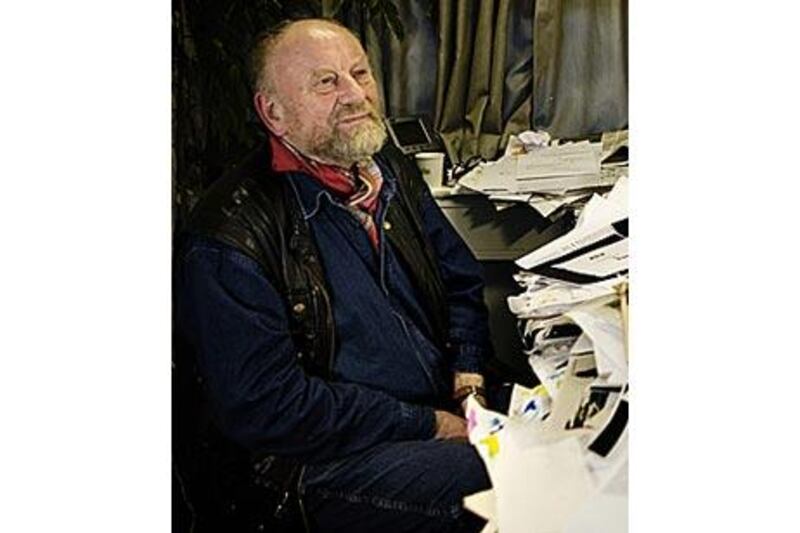NAIROBI // A Somali man with ties to al Qa'eda tried to kill an inflammatory Danish cartoonist at his home in Denmark on Friday, raising fears that extremists in the African country are training terrorists for export to the West. Police shot and wounded the 28-year-old Somali at the home of Kurt Westergaard, one of the cartoonists whose satirical drawings of the Prophet Mohammed sparked violent outrage across the Muslim world in 2005.
The alleged attacker, whose name has not been released in accordance with Danish privacy laws, was wielding a knife and an axe when he broke into Mr Westergaard's heavily fortified home on Friday night, according to police in Aarhus, a city 200km north-west of Copenhagen. He was taken into custody after police shot him in the leg and hand. "He will be charged for two murder attempts, on [cartoonist] Kurt Westergaard and on a police officer," the East Jutland police superintendent, Ole Mabsen, told Agence France-Presse.
Jakob Scharf, the head of Denmark's intelligence service, PET, said in a statement that the suspect was affiliated with al Shabab, a Somali terrorist group with links to al Qa'eda. "The attempted murder of cartoonist Kurt Westergaard is linked to terrorism," Mr Scharf said. The suspect "has close links with the Somali terrorist organisation al Shabab as well as with the heads of al Qa'eda in east Africa".
Mr Scharf went on to say in the statement: "He is also suspected of being implicated in terrorist activities when he was in east Africa. The individual arrested has also been a member of a terrorist network implanted in Denmark that has been under surveillance by PET for a long time." Mr Westergaard, 74, told the Danish news service that he was unharmed after the attempted attack. "I locked myself in our safe room and alerted the police," he said.
"He tried to smash the entrance door with an axe, but he didn't manage. He used insults, I don't remember which, but it was bad language. He spoke poor Danish and he wound up saying he'd be back." Mr Westergaard's cartoon of the Prophet with a bomb in his turban caused a fervent backlash in the Islamic world. The drawing, along with 11 others by different cartoonists, originally ran in the Danish newspaper Jyllands Posten. Muslims found them insulting to Islam while supporters defended the drawings as freedom of speech.
Violent riots followed the cartoons' publication. Danish embassies in Muslim countries were torched and dozens were killed in the demonstrations. Extremist leaders put a bounty of US$1 million (Dh3.67m) on Mr Westergaard's head. Mr Westergaard has received multiple death threats and was the subject of a previous assassination attempt. In 2008, Danish police arrested two Tunisian men suspected of plotting to kill Mr Westergaard, although neither was prosecuted.
Internet hackers last April attacked a website run by Denmark's Free Press Society selling prints of Mr Westergaard's controversial cartoon, according to the group's director, Lars Hedegaard. Despite the hacking, nearly 600 of the 1,000 signed prints have been sold, more than half of them to foreign buyers, for $250 each. Al Shabab leaders in Somalia did not immediately claim responsibility for Friday's attack. The hardline group controls most of Somalia and has been waging war against the weak federal government for three years.
Analysts say the group is al Qa'eda's affiliate in the Horn of Africa and warn that Somalia is turning into a terrorist training ground. Hundreds of foreign fighters from Pakistan and Afghanistan have joined al Shabab. Perhaps more troubling is the wave of Somali expatriates who have returned from western countries to fight alongside al Shabab. Security experts warn that these young men could receive terrorist training in Somalia and execute attacks in the West. Denmark hosts a sizeable Somali diaspora and Muslims make up 3.5 per cent of the population.
Ahmedou Ould-Abdallah, the UN envoy to Somalia, works closely with the Somali diaspora. He did not have an immediate reaction to Friday's attack in Denmark, but he has previously said Somali leaders in the diaspora should encourage their people to stay away from extremism. "Diaspora leaders should make an effort to tell their people to not stain the name of Somalia," he said. "They should say: 'We left because of chaos. We should not bring that to the host countries.'"
Somali government spokesmen could not be reached for comment. In Kenya, Somalia's neighbour to the west and home to the largest population of Somalis abroad, Somalis worried that Friday's attack could paint them in a negative light. "We want the world to know that we are mostly a peaceful bunch," Ahmed Guled Abdi, a shopkeeper, said after being told the news. "There are a few bad ones out there. They won't spoil it for the rest of us. We have all fled for some reason. We like to stay abroad in peace."
mbrown@thenational.ae * Additional reporting by Agence France-Presse





